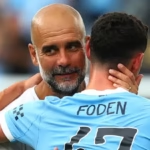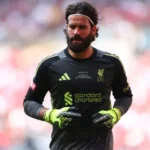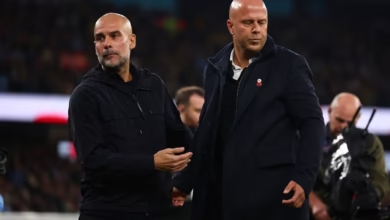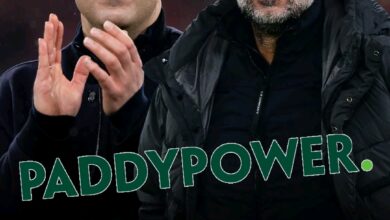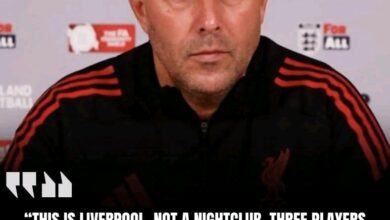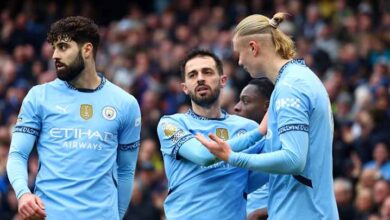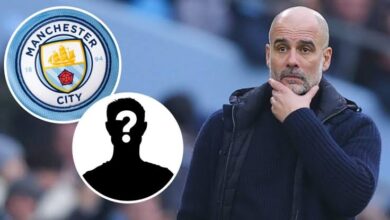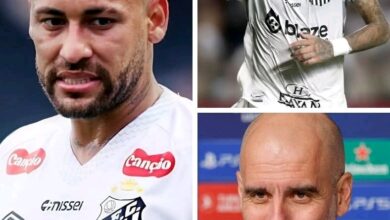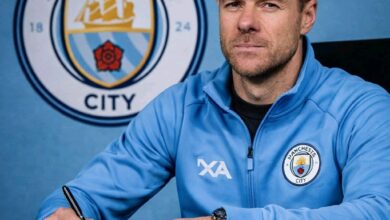‘Not good’ – Pep Guardiola firm with what Man City bosses cannot do next

In the wake of Manchester City’s emphatic FA Cup semi-final victory over Nottingham Forest, Pep Guardiola stood resolute in his assessment of the campaign. Despite securing a third consecutive FA Cup final appearance and showing signs of resurgence with an eight-match unbeaten run, the Catalan manager remained unflinching in his verdict: this season has simply “not been good” for the reigning champions.
The statement comes at a curious juncture. City have strung together six wins in their last eight matches since early March, including impressive victories over Champions League contenders Aston Villa and Nottingham Forest in the same week. For most clubs, such a run of form coupled with a place in the FA Cup final and potential participation in the Club World Cup would constitute a successful season. For Manchester City under Guardiola, however, the expectations transcend traditional benchmarks of achievement.
“Nothing can make this season a success,” Guardiola insisted in the aftermath of the Wembley triumph, his tone leaving no room for equivocation. The manager’s stark assessment underscores the elevated standards that have become the norm at the Etihad Stadium during his tenure—standards that have transformed City from ambitious contenders into the Premier League’s dominant force over the past half-decade.
The Weight of Premier League Disappointment
The root of Guardiola’s dissatisfaction lies primarily in City’s Premier League campaign. Having assembled one of the most formidable dynasties in English football history with four consecutive league titles, City’s defense of their crown effectively collapsed months before mathematical elimination, which was finally confirmed on the same day as their FA Cup semi-final victory. Liverpool, under the departing Jürgen Klopp, reclaimed the title they last won in 2020, bringing City’s unprecedented streak of dominance to an end.
For a manager who has consistently prioritized the league as the truest test of a team’s quality, this premature surrender of the title represents a significant failure. Guardiola has frequently emphasized that maintaining excellence over 38 games demands a level of consistency that cup competitions do not. The inability to sustain that consistency this season—punctuated by uncharacteristic defensive lapses and periods of attacking inefficiency—has clearly weighed heavily on the perfectionist coach.
What makes this league disappointment particularly striking is that it follows the historic treble-winning campaign of 2022/23, when City appeared to have reached new heights of tactical sophistication and mental resilience. The contrast between that immaculate season and the current campaign’s relative struggles only amplifies Guardiola’s frustration.
Champions League Aspirations Curtailed
Compounding the Premier League disappointment was City’s elimination from the Champions League, the competition that had long eluded Guardiola at the Etihad before last season’s triumph in Istanbul. Having finally conquered Europe after years of near-misses, City harbored legitimate ambitions of establishing a period of continental dominance similar to their domestic achievements.
The premature end to their Champions League defense represented another significant blow to Guardiola’s vision for the season. For a manager who has consistently identified the Premier League and Champions League as the primary barometers of success, failure in both competitions inevitably leads to his current verdict, regardless of potential consolation prizes in the FA Cup or Club World Cup.
This dual disappointment explains Guardiola’s refusal to allow recent improved performances to mask the underlying issues that have plagued his team throughout the campaign. While many managers might seize upon a late-season resurgence as evidence that fundamental problems have been resolved, Guardiola’s long-term perspective prevents such selective analysis.
The January Rebuild Initiative
Perhaps the most telling evidence of Guardiola’s assessment of City’s campaign is the £175 million spending spree sanctioned in January—an unprecedented mid-season investment that signaled clear recognition of deficiencies within the squad. This substantial outlay represented a dramatic shift from Guardiola’s stance last summer, when he resisted major changes following the treble triumph.
“The manager does not want the improved performances of his players in recent weeks to make the board think further work isn’t needed this summer,” sources close to the club have revealed, highlighting Guardiola’s determination to ensure that short-term improvements don’t obscure the necessity for continued evolution.
The January acquisitions—headlined by the arrival of attacking talent Omar Marmoush, who featured prominently in the FA Cup semi-final—were widely interpreted as the first phase of a more comprehensive rebuild. Guardiola appears intent on ensuring that this process continues through the summer transfer window, regardless of how the season concludes.
This proactive approach aligns with Guardiola’s historical management style. At both Barcelona and Bayern Munich, he regularly refreshed squads at the peak of their powers, recognizing that complacency and staleness represent greater threats to sustained success than the disruption caused by personnel changes.
The Standards of Excellence
To fully appreciate Guardiola’s perspective, one must understand the unprecedented standards he has established at Manchester City. Since his arrival in 2016, the club has accumulated trophies at a historic rate, transforming the perception of what constitutes success at the Etihad.
Under his guidance, City have claimed five Premier League titles in six seasons prior to this campaign, reached five consecutive League Cup finals (winning four), advanced to multiple Champions League latter stages, and secured the club’s first European Cup. This extraordinary period of dominance has created an environment where anything short of multiple major trophies constitutes underachievement.
This context explains why Guardiola refuses to allow potential FA Cup and Club World Cup triumphs to mitigate his overall assessment of the season. For a team that has routinely contested for every available trophy deep into each campaign, securing only secondary honors represents regression rather than success.
The manager’s uncompromising stance also serves a strategic purpose: maintaining the psychological edge that has defined his City tenure. By refusing to accept reduced standards even temporarily, Guardiola sends a clear message to players, staff, and the boardroom that the pursuit of excellence remains non-negotiable.
The Physical and Mental Toll
Beyond tactical and technical considerations, Guardiola’s comments acknowledge the immense physical and mental demands placed on a squad that has operated at the pinnacle of European football for multiple consecutive seasons. The compressed nature of recent campaigns, exacerbated by pandemic-related scheduling challenges and increased international commitments, has tested the endurance of even the most resilient players.
Recent reports of key players feeling “empty mentally” offer insight into the psychological challenges facing a group tasked with maintaining superhuman standards year after year. The cumulative fatigue of chasing unprecedented achievements inevitably affects performance levels, particularly in a league as physically demanding as the Premier League.
This reality further contextualizes Guardiola’s insistence on continued squad regeneration despite recent improved results. The manager recognizes that temporary resurgences often mask deeper issues of burnout and psychological exhaustion that can only be addressed through strategic rotation and fresh impetus from new signings.
The Erling Haaland Factor
The absence of prolific striker Erling Haaland for significant portions of the campaign has undoubtedly contributed to City’s inconsistency. The Norwegian phenomenon, whose record-breaking debut season provided the cutting edge for last year’s treble triumph, has endured several injury setbacks this term, depriving Guardiola of his most reliable goalscorer.
Recent updates from Haaland’s father Alfie suggested a potential return timeline, but the forward’s unavailability during crucial periods undeniably hampered City’s title defense. Without Haaland’s guaranteed goal threat, the team often struggled to convert territorial dominance into tangible rewards, particularly during a challenging winter period that effectively ended their Premier League aspirations.
However, Guardiola has consistently refused to use injuries—to Haaland or other key personnel—as excuses for underperformance. This philosophy stems from his belief in the depth and quality of his squad, which he considers capable of maintaining elite standards regardless of individual absences. The failure to do so this season likely reinforces his conviction that further squad enhancement is necessary.
The De Bruyne Transition
Adding another layer of complexity to City’s season has been the impending departure of Kevin De Bruyne, the creative fulcrum around whom much of Guardiola’s tactical approach has revolved. The Belgian maestro’s announcement that he will leave when his contract expires this summer marks the end of a transformative era at the Etihad.
De Bruyne’s exit represents more than the loss of a supremely talented individual; it signals the conclusion of a partnership that has defined Guardiola’s most successful period in management. Finding adequate replacement for De Bruyne’s unique combination of vision, execution, and leadership presents perhaps the most significant recruitment challenge of Guardiola’s City tenure.
Reports linking City with PSG stars and other European talents suggest the club is already actively exploring options to fill the creative void De Bruyne will leave. However, Guardiola likely recognizes that replacing such an influential figure requires more than simply identifying a technically comparable player—it necessitates a broader tactical readjustment and potentially a modified playing style.
This transition provides additional context for Guardiola’s insistence on continued squad evolution despite recent positive results. The manager understands that preparing for life after De Bruyne demands proactive planning rather than reactive measures once the Belgian has departed.
The Youth Integration Challenge
Another fascinating subplot in City’s transitional phase involves the integration of emerging talent from the club’s increasingly productive academy system. Rico Lewis, who scored in the FA Cup semi-final victory, represents the vanguard of a new generation of homegrown prospects pushing for regular first-team opportunities.
Guardiola has demonstrated admirable faith in Lewis and other young talents throughout the campaign, offering them significant minutes even during challenging periods. This approach aligns with his long-term vision for sustainable success, creating a pipeline of players immersed in his footballing philosophy from an early age.
However, the manager faces the delicate challenge of balancing youth development with the immediate demands of elite competition. The expectations surrounding Manchester City leave minimal margin for the developmental inconsistencies that naturally accompany young players’ integration into senior football.
This reality potentially explains another dimension of Guardiola’s transfer strategy: acquiring established talent to maintain competitive standards while simultaneously nurturing the next generation. The £175 million January investment suggests he believes this dual approach remains necessary despite the promising emergence of academy graduates.
The Competitive Landscape
Manchester City’s relative struggles this season have coincided with remarkable consistency from their primary rivals. Liverpool’s resurgence under Klopp, following their own disappointing campaign last year, has been particularly impressive, while Arsenal’s continued development under Mikel Arteta has established them as genuine title contenders.
This intensified competition underscores the necessity of continuous evolution rather than complacency. The Premier League’s competitive landscape has shifted significantly since Guardiola’s arrival in 2016, with multiple clubs adopting sophisticated tactical approaches and investment strategies designed specifically to challenge City’s dominance.
Guardiola appears acutely aware that standing still—even after a historic treble—inevitably leads to regression in such a fiercely contested environment. His insistence on further squad enhancement despite recent improved performances reflects this understanding of the escalating challenge posed by domestic and European rivals.
The Club World Cup Opportunity
Looking ahead, City’s qualification for the revamped FIFA Club World Cup in the United States this summer presents an intriguing opportunity to salvage additional silverware from a disappointing campaign. Following confirmation of a lucrative $1 billion deal surrounding the tournament, City’s participation carries significant sporting and commercial implications.
For Guardiola, however, success in this competition would represent a welcome addition rather than redemption for Premier League and Champions League disappointments. His priorities have always been clearly delineated, with domestic league dominance and European conquest occupying the uppermost tier of achievement.
Nevertheless, the Club World Cup offers valuable competitive experience against diverse opponents, potentially providing insights that could benefit City’s primary campaigns next season. The tournament also offers a global showcase for the club’s brand and playing style, advancing the international recognition that has become increasingly important to City’s commercial strategy.
As Manchester City prepare for their FA Cup final appearance and subsequent Club World Cup participation, Guardiola’s focus appears firmly fixed on the broader trajectory rather than immediate outcomes. His unequivocal statement that “nothing can make this season a success” serves not as defeatism but as a clear-eyed assessment of the standards his team has established.
This perspective explains his determination to ensure that t



